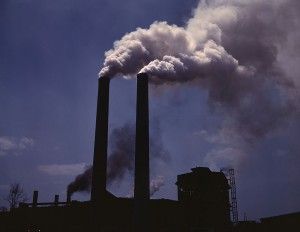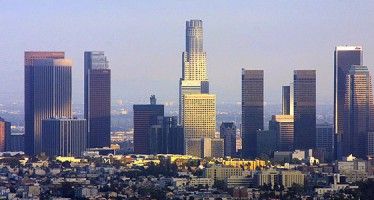Cap and Trade Shootout Looms
By WAYNE LUSVARDI
Proposition 23 lives.
On the ballot last November, it would have suspended AB 32, the Global Warming Solutions Act of 2006, until state unemployment dropped to 5.5 percent for a year. Currently, state unemployment is 11.7 percent. AB 32 mandates a 25 percent reduction of greenhouse gases in California by 2020, as well as a complex new Cap and Trade scheme for carbon emissions.
But voters dumped Prop. 23 into the Pacific Ocean.
Eight months later, it has risen from the ocean for a tentative victory.
In a stunning announcement Wednesday at a California Senate committee hearing timed to coincide with the passage of the state budget, Mary Nichols, chairwoman of the Air Resources Board, got cold feet about rolling out Cap and Trade. She announced that industries have a one-year extension to comply with the law.
Global Warming Law Getting Hot
In what must be the epitome of political double talk, Joe Costantino, a legal adviser to the Air Resources Board, said: “The delay in initial compliance lets the program get on its feet without the angst of everybody asking the question, ‘Are they ready?’ Pressure is building on the program. This lets some of that go.”
It is hard to believe that Cap and Trade still isn’t ready to be rolled out after five years of preparation.
The “pressure” Costantino refers to is an apparent vague reference to growing apprehension about whose ox is going to get gored by Cap and Trade — the working class or the middle class. This is due to the realization that pending lawsuits brought by poverty law firms might shift to entire burden of Cap and Trade onto the middle class if low-income areas or groups are exempted from provisions of the law.
A trailer bill to California’s Cap and Trade program — SB 535, the California Communities Healthy Air Revitalization Trust Act — was passed by the State Senate on June 2 and is pending in the Assembly.
SB 535 would require “at least” 10 percent of any revenue generated under the Cap and Trade portion of AB 32 to be used in “disadvantaged communities for greenhouse gas emission reduction projects, mitigation of health impact of climate change, and support for green collar jobs.”
As proposed, SB 535 would paradoxically require air excise taxes to be transferred from smoggy agricultural areas such as Visalia, Porterville, Fresno, Merced and Bakersfield to coastal low-income industrial communities that enjoy clean air, such as Oakland, Alameda, and Oxnard.
Political “Brown-Out” Emerging
Cap and Trade is facing what is called a political legitimacy crisis. If the courts exempt certain low-income communities from the Cap and Trade law on the hokey grounds that they suffer most from air pollution, and thus shift the entire burden onto the middle class, the defeat of Prop. 23 at the polls last year becomes a game of bait and switch.
Low-income groups may suffer most because Cap and Trade is a regressive tax against the poor. But shifting the entire burden of Cap and Trade onto the middle class may result in a tax revolt akin to Prop. 13 in 1978. Voters were not informed in November 2010 that voting to not suspend the state’s Green Power Law would result in higher taxes only on the middle class.
California’s Cap and Trade program is backfiring on its advocates. The Party of Government is facing a political crack up if it cannot exempt low-income communities or groups from the impacts of the law. And it faces an even greater crisis — a political “Brown Out” — if it tries to shift the entire burden of the law onto the middle class.
Last November, its opponents called Prop. 23 the “Dirty Energy Prop.” Now voters may be waking up to the reality what was dirty was not informing them of the full tax implications — and hiding subsequent trailer legislation until after the election that would exempt one group at the expense of another.
The growing reality is that Cap and Trade is not politically feasible because it either puts an untenable regressive tax on the poor or shifts the entire tax burden to the middle class.
Related Articles
Cracks in the ‘Tea’ pot
JULY 20, 2010 By KATY GRIMES As a largely leaderless organization, the anti-tax Tea Party movement experienced a brouhaha this
How will businesses react to L.A. minimum wage boost?
The Los Angeles City Council tentatively voted to increase the city’s minimum wage to $15 an hour by 2020. The
Hyperloop soon to break ground
Despite a consistent chorus of criticism from naysayers, the Hyperloop ultra-fast rail project has broken new ground, with a rapid timetable





